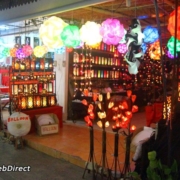Living in Koh Samui – What You Need To Know
Here you will find comprehensive advice on how to make the transition to living on Samui a little easier. Many people visit Samui on holiday, only to fall in love with the island, and on the plane ride home, they start dreaming of ways to make moving to the island a reality. Of course, holidaying in a place and relocating to live there are completely different, and there are practicalities to consider. If you’re considering the big move, here we offer a little advice to make the transition to living in paradise a little easier.
Settling into a new country – Culture shock
Moving to a new country, as exciting as it is, can also be unsettling. If you’re moving from one country to another within Europe for example, the transition won’t be so difficult as cultures are similar. But moving to the East from a Western culture takes quite an adjustment. Things don’t work the same way, and the way you react to a situation in the West, may not be appreciated here. It’s advisable to get a good book on Thai culture before moving, to familiarize yourself with the local customs and culture. After all, nobody would want to unintentionally offend their new neighbours.
Most Thais are Buddhists, and a philosophy of Buddhism is tolerance. This means that no one would tell you if you were doing something offensive, and you could blissfully carry on certain actions for years, not realizing you were offending your new Thai friends. An example of this is topless sunbathing. Although this is widely accepted in Europe, it’s frowned upon in Thailand.

When coming to terms with a new culture, don’t forget that should you be relocating with children, they also need to be made aware of local customs. Children are creatures of habit and may feel completely overwhelmed by their new environment. Be sensitive to their feelings and help them to not only make new friends, but stay in touch with old ones too.
Where to live on Samui
So you’ve been to Samui many times, and perhaps you love the buzz of Chaweng or perhaps you prefer the serenity of Taling Ngam. But you need to ask yourself this question, “Is what I want when on holiday, the same as what I want from my home?” As great as Chaweng is for a night on the town, would you want to stay amid the mayhem? As beautiful and quiet as Taling Ngam is, do you want to drive 45 minutes to school and back each day? These are things that one needs to take into account. A retired person has perhaps more choices than someone wanting to run a business or with school-going children, as then quick access to the business areas and schools needs to be considered.
You’ll find that most expats live in areas close to, but not in the main tourist drags. Living on Samui where tourism is the biggest industry, most expats are involved in the tourism business somehow, so it’s not a case of being close to the touristy spots, but rather close to work. Also, those with children will need to be near to the school that their children attend, and of course, daily chores such as grocery shopping need to be considered too.
On Samui, the biggest working expat communities are in the areas of Bang Rak, Plai Laem, Choeng Mon, Bophut, Mae Nam and the outer areas of Chaweng. Retirees often choose the less developed, and sometimes cheaper areas of Lipa Noi, Bang Po, Laem Set and Taling Ngam. Wherever you choose, it’s perhaps advisable to rent a property in the area before committing to buying one, to make sure that the area is right for the needs of you and your family.

Should you learn to speak Thai? If so where?
With Samui being a tourist hotspot, you can get away without learning Thai, as most locals have some level of English. But if you really want to feel as though you belong, learning at least basic Thai is advisable, and will impress your new Thai friends – as well as those back home! Learning a new language is hard enough at the best of times and Thai is so different from English and the European languages that originate from Latin, that for a Farang (Westerner) learning Thai can seem a little overwhelming. The best way to learn Thai is to practice it and use it whenever possible by chatting to new Thai friends and ordering in restaurants – you’ll know when the food arrives if you got it right. But, as the structure of Thai is so different to English, a beginners’ course from a reputable language school is also advised in order to understand how the grammar differs as well as master pronunciation.
There are sounds in the Thai language that don’t exist in English, such as words starting with the ‘ng’ sound. Thai is also a tonal language, meaning that the same word said in different tones could have a completely different meaning. For instance: Sowai said with a rising tone means ‘beautiful; say it with a low tone, and it means unlucky. Ma has several different meanings including dog, horse and come. There are five tones in Thai to get your head (and tongue) around: low, mid, high, rising and falling.
Some language schools offer education visas, which allow its students to stay in the country for a year at a time without having to do border runs. Be sure to pick a reputable school that is registered with the Thai Ministry of Education, and be sure to attend class. One school that has been on the island for several years and has a good reputation is Mind Your Language, located in the Old Monkey Theatre Road, between Big C and Macro. Now to hit those books…
Mind Your Language www.mindyourlanguagethailand.com

Nurseries & Schools Activities for kids
Samui has a good choice of private and international schools, and The Samui Directory has a comprehensive listing of these. A few in particular to mention include: Samui Tiny Steps Nursery & Preschool in Bophut, ISS – The International School of Samui, located near Bandon Hospital, Samui Centre of Learning, located in Lamai. Panyadee School in Chaweng Noi and Oonrak School in Mae Nam.
There’s plenty for little ones to do after school aside from going to the beach, and on this site you’ll find tried and tested suggestions on sites and activities, many of which are family friendly.
Samui Tiny Steps Nursery & Preschool www.samuitinysteps.com
ISS, The International School of Samui www.iss.ac.th
SCL International School www.sclinternationalschool.com
Panyadee School www.panyadee.ac.th
Oonrak School www.oonraksamui.com
For a full list of schools on the island, visit Siam Directory www.siamdir.com/public_services/schools
Is there much Crime on Samui?
Samui is, generally speaking, a very safe place to live. There’s little violent crime, and what there is, tends to be aimed at those delving into shady business or involved in love triangles. Of course, as with anywhere in the world, some petty crime does exist, but it’s rare due to the fact that locals are Buddhist so believe in karma. Most police, and particularly the tourist police, do speak good English, as do most lawyers’ offices.
Samui Tourist Police www.samui-tourist-police.com
Samui Tourist Police fast-dial phone number 1155
For a full list of police stations on the island, visit Siam Directory www.siamdir.com/public_services/police_stations/index.html

Koh Samui Visa Options
If you intend staying in Thailand for an extended period of time, then you’ll need more than a tourist visa. Your options include the following:
B1 (business visa)– which is the only visa on which a person can legally work. Aside from the visa, you’ll also need a work permit – they are not one and the same. There’s a fair amount of paperwork involved in getting a B1 visa, but your company (if you’re employed) or your accountant and lawyer (if you’re setting up your own company) will assist you in compiling all the necessary documentation. If you’re already in Thailand, you’ll need to do a visa run to a Thai consulate in a neighbouring country to get your visa.
Non immigrant O visa – this comes in several forms: Retirement visa, dependent visa, marriage visa or education visa. Learning to speak Thai at a reputable and recognized language school is one way to stay in Thailand on an education visa. The school will assist in preparing the necessary paperwork.
If your spouse or adult children work in Thailand, it’s possible to stay on a dependent visa, linked to their B1 visa. Again the lawyer and accountant will need to prepare the paperwork. Marriage visas are for those married to a Thai national, and there are conditions which apply. Lastly, for a retirement visa, you’ll need to show a certain amount of money in your bank account, or prove that you receive a monthly income such as a pension. Most lawyers and accountants on Samui are visa experts and will assist with preparing any paperwork required. As laws are constantly changing, it’s best to keep up to date by reading the visa requirements on the Thailand Ministry of Foreign Affairs visa page: www.mfa.go.th/main/en/services/123

Daily Shopping

Samui is no longer a small island in the sense of development, and several supermarket chains are represented on the island. You’ll find a few branches of Tesco Lotus and well as numerous Tesco Expresses, a Big C supermarket and Tops. The Makro store supplies the restaurants and resorts with their fresh and dry goods, but the public is also welcome to shop there. The supermarkets carry a wide selection of imported goods and there are several specialty shops stocking imported wines, cheeses, meats and other goods. Of course, if you’re keen to shop like a local, then do try out the fresh markets too, where fruit, vegetables comes in fresh daily.
Making new friends on Samui
Although you’re likely to miss your family and friends back home, you’ll be surprised just how many visit once they find out that your new home is on a tropical island! With today’s social media, it’s also much easier to stay in touch compared to the days of snail-mail. But of course you’ll want to make local friends too, and it’s not as difficult as you’d expect. Samui locals are a friendly bunch, and the expats are like-minded, all having moved here bringing their sense of adventure.
A great way to meet and make new friends is through local Facebook groups. Check out Samui Expats on Facebook to join a group of like-minded people and stay in the know about upcoming events and meetups.
The ‘Sisters on Samui – SOS’ holds monthly luncheons for ladies of Samui to gather over a chinwag. Each month it’s hosted at a different restaurant or resort, and money raised goes to a local charity. There are more informal weekly coffee dates too. You can find out more about these social events on www.facebook.com/Sisters-On-Samui-370606379666109/
Another way to get involved in local charities while meeting new people is to join the Samui Rotary Club. They meet the first and third Wednesday of every month at Buddy Beach Resort & Spa, from 6:00-7:00pm, and also gather for a monthly dinner. To find out how to join, visit www.rotarysamui.org
Of course, a good way to meet friends with the same interest is to join a gym or yoga studio or take up a sport. Samui has several gyms, sports arenas and yoga studios. There’s even a tennis club, badminton club and football arena too. If you relocate with children, they’ll need to make new friends too, so organize play dates with other children from their school and invite the parents along so you get to meet others.

Transport: Buying or renting a car & getting a driver’s license
Cars can be rented on a monthly basis, and the price will depend on the type of vehicle. Scooters are an affordable option, but not advisable if you are not proficient at riding one, or if you need a family vehicle. A scooter rented by the month will cost around 3,000 baht per month. Foreigners may purchase a car cash, but if you intend paying one off, you will need a Thai person to stand as surety. Cars that are produced in Thailand are considerably cheaper than those that aren’t. And generally speaking, it’s not advisable to import your car from back home, as the duties on cars are 200%, so it would pay to sell your car back home and buy a new one with those funds here. You can drive in Thailand on your driver’s license from back home, but there are advantages to getting a Thai driver’s license, such as cheaper car insurance.

To get a driver’s license on Samui, go to the Department of Transport in Nathon. Head towards Nathon from Lamai, turn left at the Raja ferry sign, continue straight down towards the sea, and the road veers to left. Go past some hotels on your right, and the Transport Department is located on your left, well back from the road. You’ll need copies of passport and visa (must be Non-O or Non-B), medical certificate, a letter from immigration with your permanent address, or copy of WP pages 1-6 and the page with last stamp. You’ll also need to bring in either an international driver’s license or your driver’s license from your home country — if you do not have this then you will need to take the tests. You will need to be there at 09:00 am for a color-blind test, reaction test and split vision test, you’ll need to bring your car, as they don’t have any to lend out. The same applies for the motorcycle license.
Health Care: Health insurance, dentists, opticians, pharmacies
Now while you may arrive on Samui with travel insurance, this is usually for a limited time, so you’ll need to consider an international medical aid that will cover you outside of the country where your passport has been issued. There are several companies that offer this, including the well-known BUPA, and there are several packages available. Samui has several private hospitals of international standard, as well as the government hospital in Nathon. They are well-equipped and staffed to deal with illness as well as trauma, and some are even renowned for their plastic surgeons should you feel the need for a makeover to go with your new life on Samui.
The Bandon International Hospital offers excellent facilities and service via its modern and well-equipped medical facility in Bophut. The hospital has both a surgery and a trauma centre and even has an international clinic on the neighbouring island of Koh Phangan. You’ll find Bandon near Big C Shopping Centre.
Bandon International Hospital www.bandonhospitalsamui.com +66 (0) 7724 5236
The Bangkok Hospital Samui offers a wide range of services and the staff and doctors have a high level of English. The standards at this hospital rival the best Western hospitals. A discount is offered to expat residents. Bangkok Hospital is located on the ring-road in Chaweng, shortly before Chaweng Noi.
Bangkok Hospital Samui www.samuihospital.com +66 (0) 7742 9500
Samui International Hospital is one of the island’s newest hospitals and offers a wide range of services including cosmetic and dental procedures for both inpatients and outpatients. The hospital is even equipped with its own swimming pool for convalescent patients, and staff can speak a number of languages including English, French and German to a high standard. The hospital is located at the northern end of Chaweng Beach Road.
Samui International Hospital www.sih.co.th +66 (0) 7723 0781/2
Thai International Hospital offers a wide range of services including a 24-hour accident and emergency centre and its own resident plastic surgeon. The hospital is located in opposite Tesco Lotus, Chaweng.
Thai International Hospital www.thaiinterhospital.com +66 (0) 7724 5721
Samui Government Hospital is located on the outskirts of Nathon, Samui’s Government Hospital will probably be a last resort for foreign tourists who will normally choose one of the island’s private hospitals. The government hospital is reasonably well equipped but not to the same extent as other hospitals on the island, and the level of English is generally lower. It is of course cheaper than the private hospitals. Turn down the road by immigration, when exiting Nathon travelling anti-clockwise.
Samui Government Hospital +66 (0) 7742 1230
You won’t need to drive more than a few hundred metres in the island’s busier areas to come across a pharmacy, and most are open well into the night, and some even 24 hours a day. Medication is well-priced, most pharmacists speak good English, and can dispense antibiotics without a doctors prescription.
There is also an abundance of both dentists and optometrists in the shopping areas, and prices are considerably cheaper than what you’d pay in Western countries.
Chaweng Dental Care +66 (0) 7796 0807
For a comprehensive list of dentists, visit the Siam Directory www.siamdir.com/health/dentists
There aren’t many doctors’ offices around, as most doctors tend to practice out of the hospitals, so this is where you’d go even for a check-up.
For a comprehensive list of doctors, visit the Siam Directory www.siamdir.com/health/doctors
If you’re thinking of bringing your beloved dog or cat over with you, this can be done and all info required can be found at the Department of Livestock Development’s website www.dld.go.th/webenglish/movec1.html Once here, Samui has several good veterinarians to take care of them.
For a comprehensive list of veterinarians, visit the Siam Directory www.siamdir.com/health/veterinarians

Renting or buying a house or apartment
It’s advisable to first rent a house for at least six months to find out if you are happy with your chosen area before committing to buying a property. This will also give you the opportunity to explore the island and discover other areas that may be better as long term options, and to put the word out that you are looking for a good deal. Often when people buy right after arriving, they aren’t aware of market-related prices.
There are certain restrictions regarding foreigners buying land in Thailand, and your lawyer will be able to advise on this. Condominiums can be owned outright, but land cannot, and the company that is buying the property will need to have a Thai partner.
Rental properties range from 10,000 baht per month for a small bungalow, suitable only for a single or a couple. An average three-bedroom house in the suburbs, fully furnished, will cost between 30,000 and 60,000 baht per month excluding utilities, and of course luxury properties will go up from there.

Lawyers, accountants and banking
There are several good legal and accounting offices on the island, and most offer both services from one office. Often, a western lawyer or accountant has teamed with a local one, meaning you get the best of both, with a partner understanding the local rules and regulations, and the other being sensitive to the questions a westerner would have. It would be best to work on a personal recommendation when finding your lawyer and accountant, as this is the person that will help you with much of the red-tape needed to settle on Samui – from visas to starting a company and applying for a work permit. Alternatively, the Samui Directory has a comprehensive list of legal and accounting firms listed. www.siamdir.com/business_service/accounting_legal_assistance
To open a bank account, you’d need to show that you are on a long-stay visa, either a B1 or non-immigrant O (dependent, retirement or education). Banking fees are quite low compared to other countries, and generally speaking, at least one staff member will speak good English. Other than at the branches, there are ATMs throughout the island. To draw cash from a foreign card endures a fee of 150 baht, so the sooner you can use a local account, the better. Withdrawing from your own local bank is free, and from another ATM, usually around 10 baht. The Samui Directory has a list of banks www.siamdir.com/business_service/banks

Working, starting a business & work permit
If you’ve come over with a pre-arranged job offer, then your company will assist in the paperwork to get your B1 visa as well as the work permit. Most jobs for foreigners tend to be in the tourism industry, and many people set up their own businesses. Your lawyer will be able to advise you on setting up your own company, including the costs and legalities. Generally speaking, to set up a new company that can have one work permit, will cost you around 50-60,000 baht to set up, and a further 20,000 for the initial work permit. Fees go up for companies that require more than one foreigner work permit.
If you have a little capital, it may be best to come over for at least six months, experience the island and do thorough research before throwing your hard-earned savings into a business. Many people have been burnt this way, thinking they ‘know just what the island needs’, based on a few holiday visits. Speak to other locals and expats, check to see if it’s been done before. Find out about any hidden setup costs, and do a proper market research.
Have you goy experience living on Koh Samui? Or maybe you have unanswered questions about moving and living here? We’d love to hear your thoughts in the comments below!
This article was originally published on samuiholiday.com

 Samui Expats
Samui Expats


Thank you, this is great information! I will be referring to this article throughout my journey. 🙏 See you in Koh Samui!